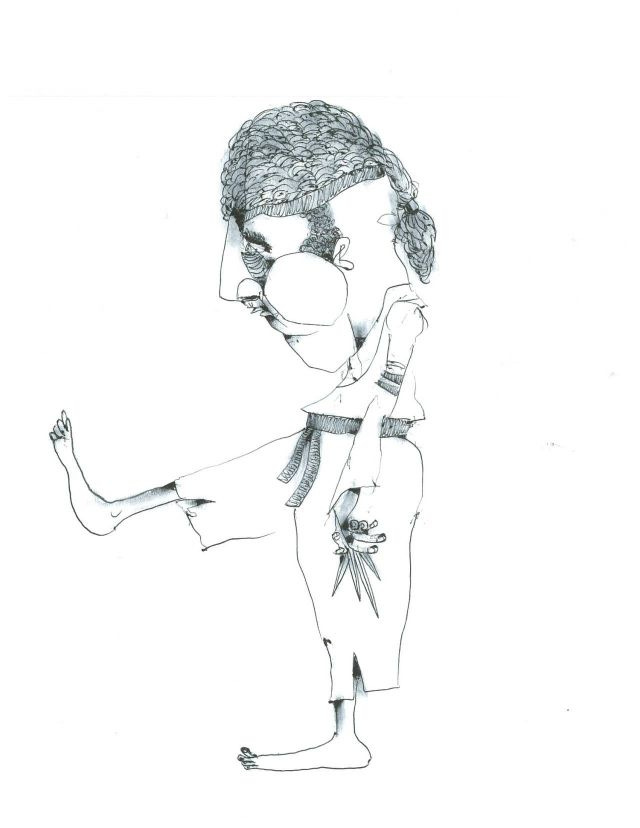80s Movies
Maddd Science

Plenty of good movies from the 80s don't qualify as "good 80s movies." By my standards, they need synths, practical effects, and poor fashion choices. Back to the Future is likely the best example, even if it's mostly set in the 50s (which makes it the retro version of a turducken when watched in the 2010s, but let's not get too far off topic).
I tend to enjoy the often terrible, cheesy genre enough that "From Beverly Hills Cop Soundtrack" was in the title of the opening track on my auto-personalized Spotify playlist this week. Here are a few articles about how 80s movies reflected the culture of the time, for better or for worse. Wait, mostly just the "for worse" part.
To Donald Trump, The American City Will Always Be A Dystopic, ‘Eighties Movies’ New York
Ezekiel Kweku, MTV News
Movies that operate in the world of the fantastic can be an escapist retreat. But just as often, instead of withdrawing from their own era, they embody its concerns and preoccupations. Watching science fiction and fantasy movies is like reading the dream journal of the collective subconscious. Donald Trump's campaign, a bundle of exposed nerve endings and raw fear, took its campaign rhetoric about cities directly out of the pages of this journal. His vision of the city is not drawn from the lived experience or statistical reality of life in the average American city in 2017. For him, the city is a nightmare vision of the New York of the '70s, '80s, and early '90s — Old Future New York.
Finally, an article on the real hero in Ferris Bueller.
Save Jeanie: On ‘Ferris Bueller’s Day Off’s’ 30th Anniversary, A Tribute To The Misunderstood, Mistreated Jeanie Bueller
Jen Chaney, Uproxx
I don’t believe that John Hughes was consciously attempting to comment on gender politics or white privilege when he wrote and directed Ferris Bueller’s Day Off. The filmmaker famously penned the screenplay in less than a week and shot it based on that swiftly crafted draft. He was probably aiming primarily for what would work from a comedy perspective, and a storyline about a sibling both exasperated by and resentful of her brother’s good fortune is a solid set-up for laughs. But sometimes even subconscious subtexts become more noticeable and relevant, especially with the passage of time.
Another trope that rose to prominence with the rise of 80s action blockbusters:
The good guy/bad guy myth
Catherine Nichols, Aeon
Less discussed is the historic shift that altered the nature of so many of our modern retellings of folklore, to wit: the idea that people on opposite sides of conflicts have different moral qualities, and fight over their values. That shift lies in the good guy/bad guy dichotomy, where people no longer fight over who gets dinner, or who gets Helen of Troy, but over who gets to change or improve society’s values. Good guys stand up for what they believe in, and are willing to die for a cause. This trope is so omnipresent in our modern stories, movies, books, even our political metaphors, that it is sometimes difficult to see how new it is, or how bizarre it looks, considered in light of either ethics or storytelling.
Also, let the record show I was planning to post the Aeon article above before Metafilter featured it yesterday. I need all the curation cred I can get here, given how often I actually do feature articles the site surfaces.
Anyway, enough of me pointing out behind-the-newsletter minutiae that you don't care about. Here's an article I found on Metafilter:
Straight outta Romford: Britain’s hard-man movie scene
Robert Jackman, Little Atoms
He is unapologetic in his anti-snobbery – Sothcott makes films for white van-men and weekend dads; the kind of men who feel ignored by the mainstream studios. But for all his egalitarian claims, he enjoys a more full-blooded lifestyle. His Twitter feed is replete with celebrity parties and business class jets to LA. When I put this to him, he is bashful (“that’s just my private life”), insisting there is no contradiction between goading Mark Kermode for being out-of-touch (a favourite pastime of Dyer super-fans) before going on to lunch at the Groucho.
Inside the Toxic, ‘Intellectually Superior’ World of Facebook’s ‘Rick and Morty’ Fans
Katie Fustich, Medium
Perhaps this “type” of fan would be easy to ignore, were it not for multiple highly public incidents that seem to implicate the show and its viewers as a whole. In September 2017, “Rick and Morty” fans doxxed several of the show’s female writers, claiming that it was necessary retaliation for what they felt to be an inadequate third season. Even if female writers were not responsible for some of the third season’s most-beloved episodes (specifically, one involving the aforementioned and clearly beloved Pickle Rick), the irony would still be gargantuan and, ultimately, lost on these fans.
The Man Who Made Black Panther Cool
Abraham Riesman, Vulture
“I’m an asshole. I’m abrasive. I am so sure that I’m right about virtually everything. I can sing you an aria of reasons to not like me,” says comics writer Christopher Priest, his bass voice rising to the brink of anger but never quite tipping over. “Not liking me because I’m black is so juvenile and immature, because there’s many reasons to not like me.”
This thread on how the tonally and stylistically anomalous "Pink elephants on parade" segment wound up in Dumbo.
Julia Galef, Twitter
Next Week on Maddd Science: Franchising